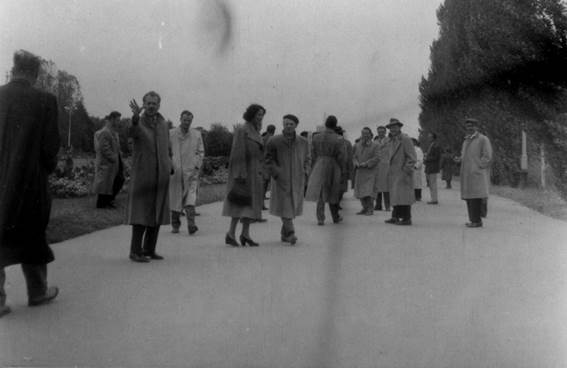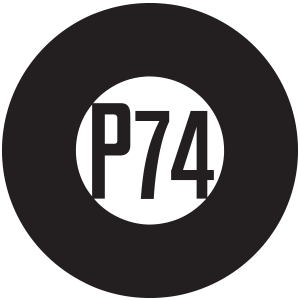
Tadej Pogačar, Forester. Memories lost / Gozdar. Izgubljeni spomini, artist book, 2020
A new artist book by Tadej Pogačar
We are pleased to announce the release of a new artist book by Tadej Pogačar, Forester. Memories lost / Gozdar. Izgubljeni spomini. The book was published by the P.A.R.A.S.I.T.E. Institute in collaboration with P.A.R.A.S.I.T.E. Museum of Contemporary Art. The book was designed by Nastja Miheljak, it is black-and-white and has forty pages.
Forester. Memories lost / Gozdar. Izgubljeni spomini is the eleventh artist book by Tadej Pogačar. As already in some of his other editions, e. g. Home stories (1999), Twenty-Eight Cakes (2009), Tito times Thirty (naked) (2010), Our Woman (2018), he used the default photo as material.
P.A.R.A.S.I.T.E. Museum of Contemporary Art, founded in 1993 by Tadej Pogačar, owes its origins to various sources, one of the most important being history from below, established by Lucien Febvre in the 1930s. It is a social history of ordinary people that has been most often overlooked and underestimated. P.A.R.A.S.I.T.E. Museum of Contemporary Art has actively implemented this revisionist conception of history in almost three decades of its activities in numerous joint projects with the homeless people, sex workers’ organizations, research on street trade and the parallel economy.
Photos in the book Forester. Memories lost are the legacy of Pogačar’s late father. His father came from a peasant family. After the arson of the homestead and the village Zlato polje above Lukovica in August 1942, he joined the partisans at the age of seventeen. His parents were taken to a concentration camp. After the liberation, he completed his education as a forestry technician in Zagreb. Photos of Pogačar’s father (photos of a forester) are a lost memory, time and space about which we know little or even nothing. They document the everyday life, socializing with friends, travels, images of landscapes. We don’t recognize most locations, nor do we recognize the people. The photos are not thematically or chronologically arranged or dated. The order of succession is random. They were created in the 1960s.
The introductory photo shows a group of people taking a walk. A man in a long coat gesticulates towards the lens. Who are these people? Are they random citizens in an unknown city? There is no detail in the photo that would help us with spatial or temporal orientation. A clip from a picnic follows. In the front row stands a girl, behind her a man, and to the right a woman with a badminton racket in the middle of the game. The girl is feeling uncomfortable. The background shows a haystack and under it a table with chairs. Where are they? Another shot captures a group of people sitting at a table by the lake. The shot is unusual as the photographer tried to capture people through the branches of a bush. We can only speak with certainty about the season the photo was taken, that is, in early spring or late autumn, when the leaves have not yet sprouted or have already fallen off. All these events and motifs are mysterious to us and cannot be explained. We don’t possess any story to approach them. So, what can give them meaning? Memories significantly co-shape our identity and self-image. Failure to remember them would have fatal consequences for our language, relationships, and personal identity. Neuroscientists warn us that the process of storing and recovering memory data is very unreliable. Memory is easy to manipulate with and therefore its value is relative. Even more, memories of events that never really happened can be implanted.
Tadej Pogačar (1960) is an artist, curator and lecturer. After studying art history and ethnology at the Faculty of Arts in Ljubljana, he graduated from the Academy of Fine Arts in Ljubljana, where he also completed his postgraduate studies at the Department of Painting. In his artistic practice, he uses the logic of intervention, critical research, and participatory practice. He has participated in biennials of contemporary art in Venice, Prague, Tirana, Sao Paulo, Istanbul and at Manifesta 1 in Rotterdam. He is the recipient of several awards, scholarships and residencies. As a curator, he has prepared numerous exhibitions of contemporary art, among others, RIO (2019), The Victorious Four (2018), The Economy of Nature (2017), The Second Explosion – The ‘90s (2017), PROTESTS. 6 case studies (2013), The Other Museum (2011), Artist Book in Slovenia 1966 – 2011 (2010), Public Services (2006 – 2007), Goran Trbuljak 1973 – 2004 (2005), Revisions. Painting 70+90 (2001) (with Tanja Mastnak), For Quality of Life (1997), Through the Glass. Young Hungarian Art (1995).
>> With each purchase of P.A.R.A.S.I.T.E. Institute publications you actively support the activities of P74 Gallery. The price of the artist book by Tadej Pogačar, Forester. Memories lost, is 15.00 EUR. You can order it at the e-mail address p74info@zavod-parasite.si or buy it directly in the P74 Gallery (after reopening), Trg Prekomorskih brigad 1, 1000 Ljubljana (Monday to Friday, 12.00 to 18.00).

